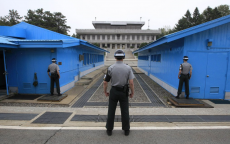
Before engaging with the main argument it is imperative that the historian first considers the existing historiography, albeit rather limited for this topic. As there has been little academic attention given directly to the question of UN involvement in Korea, we must draw much of our evidence and source material from inferences made in Cold War texts. The terms orthodox, revisionist and post-revisionist therefore have not technically been applied to this topic per se; nonetheless in order to maintain a theoretical framework it is most favourable that we employ these categories when assessing the causal variables of the division between North and South Korea. This paper will apply the label of ‘orthodox’ thought to those sources depicting Communist influences (specifically North Korea, the USSR and China) as the aggressors responsible for the Korean divide as that was the initial overwhelming reaction amongst scholars in the 1950s and is even largely entertained today. Such key orthodox sources will therefore include numerous primary sources such as the US foreign policy towards Korea and American newspapers from the 1950s. Many of these can be found in the Wilson Centre Digital Archive and US State Department Office of the Historian. We must note therefore the western centric nature of many of our sources, though with the rise of revisionism in the late 1960s new critical approaches were taken to US and UN involvement in the Korean War. The leading ‘revisionist’ scholar Isidor Stone bravely first published his book in 1952 a year prior to the Korean armistice and more than a decade ahead of most revisionist scholars, defying mainstream accepted ‘orthodox’ literature in the US and risking being labelled a communist. The brilliance of Stone was largely ignored in the 1950s during the peak of McCarthyism and the ‘Red Scare’ paranoia in the US with many reviews labelling his work as no more than ‘pure calculated rubbish’ or understandably ignored by many publishers yet when republished in 1970 after US failure in Vietnam, Stone’s work was acknowledged as outstandingly innovative, intriguing and insightful. Stone’s The Hidden History of the Korean War has deservedly received a great level of commendation as a whole and set a precedent for insight into the Korean War and challenging generally accepted views over United States and United Nations involvement in international affairs.
Jon Halliday, David Halberstam and Bruce Cumings took Stone’s work further in criticising both the US and UN for their part in dividing Korea though it must be noted that Cumings’ and Halliday’s arguments contain a noticeable communist bias. This does not discredit their entire works and indeed they make some excellent points but the bias must be taken into consideration. Finally, post-revisionist thought may be applied to more recent sources able to use the benefits of hindsight and the translation of South Korean texts, giving personal insight on the nation’s divide. Don Oberdorfer’s The Two Koreas: A Contemporary History is an excellent post-revisionist text, considering numerous arguments in an attempt to understand the current extreme divide and furthermore how one might go about uniting the troubled nation once again. His complete history of the Korean divide, as it were, considering the situation from numerous angles whilst attempting to avoid bias, makes this an excellent source for this paper. Victor Cha contrastingly focuses on the evolution of North Korea from a post-revisionist perspective which provides an alternative and quite unique perspective of events. These post-revisionist sources would seemingly be the most informed and useful therefore but all schools of thought will be necessary in contributing to various arguments within this paper, particularly due to the overall lack of source material clearly tackling the role of the United Nations in dividing North and South Korea.

0 Comment:
Be the first one to comment on this article.